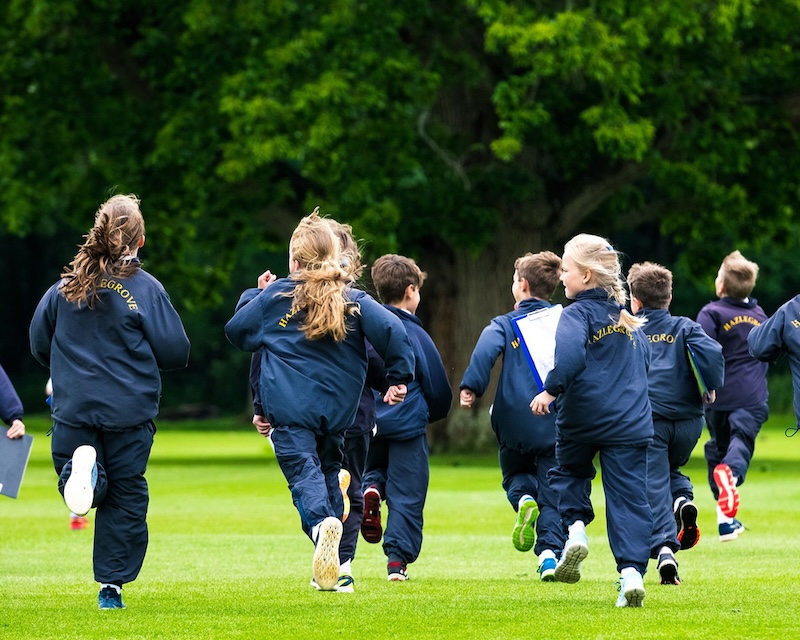Senior Schools – the changing landscape
Posted on 28th May 2024 in Prep Schools Guide, Curriculum
Mr Ed Benbow, Headmaster of Hazlegrove Prep School, comments on how the changing demands of senior schools, universities and beyond are creating the ideal opportunity for prep schools to challenge and broaden their curriculum provision.
There is an analogy that I have discovered that our children’s education is increasingly being shaped like an egg timer. Children start their educational journeys in primary schools, pre-prep schools and prep schools in a world of space, wonder, and discovery, yet as they approach the age of eleven, their world starts to narrow as they enter the confines of 11+ pre-tests for senior schools, followed by a fact-based GCSE syllabus, and only then does their imagination and inquisitiveness open up again as they explore A-Levels and beyond.
My clear vision is that we aim to prize open that egg timer effect and remove whatever educational shackles we can from our children. The speed of change within technology and the senior school assessment process is providing prep schools with a priceless and timely opportunity to reshape their offering, particularly in Years 7 and 8. Ultimately, our goal is that our children move on to their senior schools with a strong sense of the “3Cs” - Curiosity, Creativity, and Confidence. There are several trends that are emerging within our senior schools and beyond that will play a very important part in steering the direction that we take as prep schools in the years ahead.
GCSE & A-Level choices
The numbers of pupils selecting certain GCSE and A-Level subjects has changed. There are many reasons for this, including the style of assessment used to award the qualification, the requirement for that qualification as part of a Higher Education offer, and the relevance of that subject for the future plans of the individual pupil. At A-Level,
nationally there has been a shift away from the Arts, Modern Languages, English, and Classics towards areas such as STEM based subjects, Business, Economics, Psychology and Geography. At A-Level, one of the biggest factors that has influenced subject uptake has been the relaxation of specific subject requirements for certain courses offered by universities, with pupils often opting for A-Level choices that they may feel are more accessible, rather than those that may have traditionally been required.
Modern Languages have arguably seen the most marked decline in demand of late. The national picture is one of decreasing language uptake at GCSE, especially in French and German. Many schools still believe in the importance of at least one MFL option and have retained MFL as part of the core curriculum. Other schools have decided to make MFL completely optional, with the decision often depending on the profile of pupils in the school, and the other subjects available. The shift in MFL seen at GCSE has also been reflected in A-Level uptake nationally, and some universities are reducing/changing the language degrees that they offer.
Artificial intelligence
Senior schools are already on the front foot, with a steely determination to exploit rather than be exploited. The rise and accessibility of AI has presented both concern and opportunity for schools and pupils. On the one hand, AI could be used to help support pupils using advanced tutoring packages, differentiated learning, provision of resources and materials, as well as a host of amazing new teaching and learning mechanisms.
However, as is often the case with technology, it can be abused and schools are having to manage how pupils use AI, educate them in the dangers of AI, look closely at malpractice and plagiarism using AI. The DfE and exam boards are looking very closely at how AI should be used in schools when it comes to assessments. AI is developing at such a speed that many schools and awarding organisations are struggling to keep pace. Yet there is huge potential with AI to help support pupils’ learning, if it is used in the right way. As a Foundation, we are currently exploring four areas in particular:
- Preparation of resources
- Tutoring (both in class and as a follow-up to lessons)
- Feedback on pupils’ work
- The dilemma of written assessments in a technological world

University vs apprenticeships
Whilst university remains the most popular route for many pupils following the completion of Sixth Form, pupils are now more willing to explore and follow other options. Degree apprenticeships, apprenticeships and internships have all become increasingly popular, covering corporates such as KPMG, Dyson, and Rolls-Royce. The opportunity to gain a recognised undergraduate degree whilst earning a salary, and with a guaranteed job at the end has lured many pupils to explore the exciting degree apprenticeships available, particularly in a world where the cost of university fees is being scrutinised and the value of a degree in today’s recruitment world is being re-evaluated. However, the better degree apprenticeships and apprenticeships are incredibly competitive, with university remaining the most accessible route for many pupils. An increasing number of pupils are also looking to explore university options abroad, whether that be in Europe, the USA or further afield.
Corporate recruitment
The job market is naturally changing fast given the speed of technological change, and with that comes a dramatic shift in the way corporates are recruiting. The days of sifting through CVs screening for a 1st and 2:1 from the UK’s leading universities is rapidly shifting towards a focus on far less tangible skills, such as problem-solving, creativity, curiosity, teamwork. As mentioned above, there is also far more emphasis on apprenticeship schemes than in the past.
Evolving curriculum
Ultimately this approach is now being adopted by senior schools as they look to align themselves in terms of their curriculum and preparation for life beyond 18. We too are seeing a shift in expectations from our senior schools. The vast majority no longer require Common Entrance as a formal entrance exam, with unconditional places being offered in Years 6 and 7. As a result, most prep schools including us mark our Common Entrance papers internally, and now have the priceless opportunity to maintain the level of content and academic rigour but steer the curriculum in a more differentiated way.
Here at Hazlegrove, we are being as open-minded and creative as we can in opening our children’s minds and creating a greater sense of wonder and creativity. As well as a hugely diverse timetable that, from Year 3, incorporates the likes of Art, DT, Food Technology, Music, Drama, Swimming, PE, Sport and PSHE, we are also opening their eyes
to the great outdoors, to current affairs, nature, and climate change. Content and academic rigour run through all that we do, and children and departments collaborate to deliver a more enriching learning experience. Using History as an example, our philosophy is to learn from the subject rather than about it, which will be an invaluable approach to learning as we prepare our children for the challenges that lie ahead. As a Maths teacher, I have also been delighted to see a greater emphasis placed on problem solving, rather than simply learning methods, and regurgitating them.
Education in the UK is facing many challenges, both financial and academic, and whilst this is creating an added burden of stress on teachers, it is presenting a hugely exciting time for the way in which we can educate and inspire our children, and ultimately stretch open the egg timer, nurturing a greater sense of curiosity, creativity, and confidence in every one of them.
This article appears in the 2024 edition of John Catt's Preparatory Schools, which you can view here: